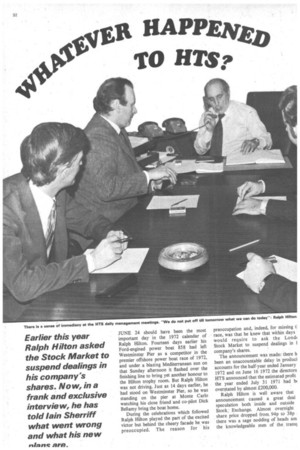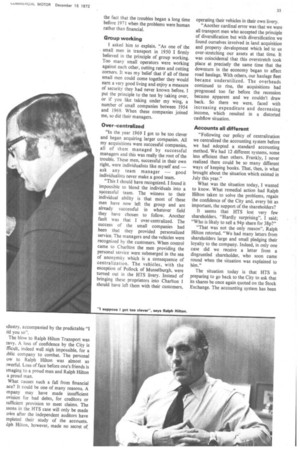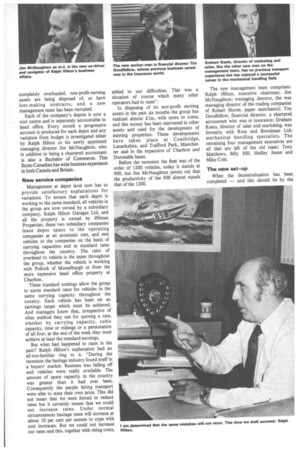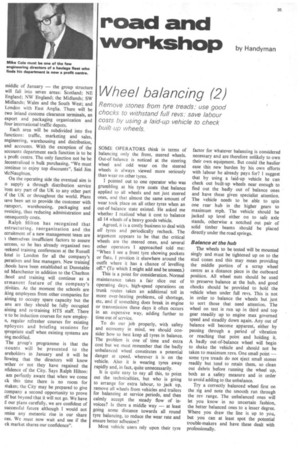,o sit HAPPEN .+P HTs?
Page 34

Page 35

Page 36

Page 37

If you've noticed an error in this article please click here to report it so we can fix it.
Earlier this year Ralph Hilton asked the Stock Market to suspend dealings in his company's shares. Now, in a frank and exclusive interview, he has told lain Sherriff what went wrong and what his new
rannc are_
JUNE 24 should have been the most important day in the 1972 calendar of Ralph Hilton. Fourteen days earlier his Ford-engined power boat 858 had left Westminster Pier as a competitor in the premier offshore power boat race of 1972, and under a blazing Mediterranean sun on that Sunday afternoon it flashed over the finishing line to bring yet another honour to the Hilton trophy room. But Ralph Hilton was not driving. Just as 14 days earlier, he had stood on Westminster Pier, so he was standing on the pier at Monte Carlo watching his close friend and co-pilot Dick Bellamy bring the boat home. During the celebrations which followed Ralph Hilton played the part of the excited victor but behind the cheery facade he was preoccupied. The reason for his preoccupation and, indeed, for missing t' race, was that he knew that within days would require to ask the Land( Stock Market to suspend dealings in i company's shares. The announcement was made: there h been an unaccountable delay in produci accounts for the half-year ended January 1972 and on June 16 1972 the directors HTS announced that the estimated profit the year ended July 31 1971 had bi overstated by almost £200,000. Ralph Hilton is well aware that announcement caused a great deal speculation both inside and outside Stock. Exchange. Almost overnight share price dropped from. 94p to 38p . there was a sage nodding of heads am. the knowledgeable men of the trans] klustry, accompanied by the predictable "I )1d you so".
The blow to Ralph Hilton Transport was eavy. A loss of confidence by the City is fficult, indeed well nigh impossible, for a ablic company to combat. The personal ow to Ralph Hilton was almost as )werful. Loss of face before one's friends is imaging to a proud man and Ralph Hilton a proud man.
What causes such a fall from financial ace? It could be one of many reasons. A impany may have made insufficient ovision for had debts, for creditors or sufficient provision to meet claims. The mons in the HTS case will only be made ocvn after the independent auditors have mpleted their study of the accounts. dph Hilton, however, made no secret of
the fact that the troubles began a long time before 1971 when the problems were human rather than financial.
Group working I asked him to explain. "As one of the small men in transport in 1950 I firmly believed in the principle of group working. Too many small operators were working against each other, cutting rates and cutting corners. It was my belief that if all of these small men could come together they would earn a very good living and enjoy a measure of security they had never known before. I put the principle to the test by taking over, or if you like taking under my wing, a number of small companies between 1954 and 1969. When these companies joined me, so did their managers.
Over-centralized "In the year 1969 I got to be too clever and began acquiring larger companies. All my acquisitions were successful companies, all of them managed by successful managers and this was really the root of the trouble. These men, successful in their own right, were individualists like myself and — ask any team manager — good individualists never make a good team.
"This I should have recognized. I found it impossible to blend the individuals into a successful team. The witness to their individual ability is that most of these men have now left the group and are already successful in whatever field they have chosen to follow. Another fault was that I over-centralized. The success of the small companies had been that they provided personalized service. The managers and the vehicles were recognized by the customers. When control came to Charlton the men providing the personal service were submerged in the sea of anonymity which is a consequence of centralization. The vehicles, with the exception of Pollock of Musselburgh, were turned out in the HTS livery. Instead of bringing these proprietors into Charlton I should have left them with their customers, operating their vehicles in their own livery.
"Another cardinal error was that we were all transport men who accepted the principle of diversification but with diversification we found ourselves involved in land acquisition and property development which led to us over-stretching our assets at that time. It was coincidental that this overstretch took place at precisely the same time that the downturn in the economy began to affect road haulage. With others, our haulage fleet became underutilized. The overheads continued to rise, the acquisitions had progressed too far before the recession became apparent and we couldn't draw back. So there we were, faced with increasing expenditure and decreasing income, which resulted in a distorted cashfiow situation.
Accounts all different "Following our policy of centralization we centralized the accounting system before we had adopted a standard accounting method. We had 12 different systems, some less efficient than others. Frankly, I never realized there could be so many different ways of keeping books. That, then, is what brought about the situation which existed in July this year."
What was the situation today, I wanted to know. What remedial action had Ralph Hilton taken to solve the problems, regain the confidence of the City and, every bit as important, the support of the shareholders?
It seems that HTS lost very few shareholders. "Hardly surprising", I said; "Who is likely to sell a 94p share for 38p?"
"That was not the only reason", Ralph Hilton retorted. "We had many letters from shareholders large and small pledging their loyalty to the company. Indeed, in only one case did we receive a letter from a disgruntled shareholder, who soon came round when the situation was explained to him."
The situation today is that HTS is preparing to go back to the City to ask that its shares be once again quoted on the Stock Exchange. The accounting system has been completely overhauled, non-profit-earning assets are being disposed of, as have loss-making contracts, and a new management team has been recruited. Each of the company's depots is now a cost centre and is separately accountable to head office. Every month a progressive account is produced for each depot and any variation from budget is investigated either by Ralph Hilton or his newly appointed managing director Jim McNaughton, who in addition to being a chartered accountant is also a Bachelor of Commerce. This Scots-Canadian has wide business experience in both Canada and Britain.
New service companies
Management at depot level now has to provide satisfactory explanations for variations. To ensure that each depot is working to the same standard, all vehicles in the group are now owned by a subsidiary company, Ralph Hilton Garages Ltd, and all the property is owned by Hilmac Properties; these two subsidiary companies lease depot space to the operating companies at an economic rent, and rent vehicles to the companies on the basis of carrying capacities and at standard rates throughout the country. The ratio of overhead to vehicle is the same throughout the group, whether the vehicle is working with Pollock of Musselburgh or from the more expensive head office property at Charlton.
These standard castings allow the group to quote standard rates for vehicles in the same carrying capacity throughout the country. Each vehicle has been set an earnings target which must be achieved. And managers know that, irrespective of what method they use for quoting a rate, whether by carrying capacity, cubic capacity, time or mileage or a permutation of all four, at the end of the week they must achieve at least the standard earnings. But what had happened to rates in the past? Ralph Hilton's explanation had an all-too-familiar ring to it. "During the recession the haulage industry found itself in a buyers' market. Business was falling off and vehicles were really available. The amount of spare capacity in the country was greater than it had ever been. Consequently the people hiring transport were able to state their own price. This did not mean that We were forced to reduce rates but it certainly meant that we could not increase rates. Under normal circumstances haulage rates will increase at about 10 per cent per annum to cope with cost increases. But we could not increase our rates and this, together with rising costs, added to our difficulties. This was a situation of course which many other operators had to meet". In disposing of its non-profit earning assets in the past six months the group has realized almost £ lm, with more to come, and this money has been reinvested in other assets and used for the development of existing properties. These developments have taken place at Coatbridge, Lanarkshire, and Trafford Park, Manchester and in the expansion of Charlton and Dunstable bases. Before the recession the fleet was of the order of 1200 vehicles, today it stands at 900, but Jim McNaughton points out that the productivity of the 900 almost equals that of the 1200. The new management team comprises: Ralph Hilton, executive chairman; Jim McNaughton; managing director, (he was managing director of the trading companies of Robert Horne, paper merchants); Tim Goodfellow, financial director, a chartered, accountant who was in insurance; Graham Keats, director of sales and marketing, was formerly with Ross and Bonniman Ltd; mechanical handling specialists. The remaining four management executives are all that are left of the old team: Tony Matthews, Billy Hill, Hedley Jenne and Mike Cole.
The new set-up
When the decentralization has been completed — and this should be by the middle of January — the group structure will fall into seven areas: Scotland; NE England; NW England; the Midlands; SW Midlands; Wales and the South West; and London with East Anglia. There will be two inland customs clearance terminals, an export and packaging organization and four international traffic depots.
Each area will be subdivided into five functions: traffic, marketing and sales, engineering, warehousing and distribution, and accounts. With the exception of the accounts department each function is to be a profit centre. The only function not be be lecentralized is bulk purchasing. "We must :ontinue to enjoy top discounts", Said Jim VIcNaughton.
On the operating side the eventual aim is o supply a through distribution service 'rom any part of the UK to any other part 1 the UK or throughout the world. Plans lave been set to provide the customer with ransport, warehousing, packaging and nvoicing, thus reducing administration and :onsequently costs.
Ralph Hilton has recognized that estructuring, reorganization and the ecruitment of a new management team are themselves insufficient factors to assure uccess, so he has already organized two reekend training conferences at the Russell Iotel in London for all the company's peratives and line managers. New training :hoots have been established at Dunstable rid Manchester in addition to the Charlton :loot and training will continue as a errnanent feature of the company's :tivities. At the moment the schools are acing employees from other companies for aining to occupy spare capacity but the ans are they should be fully occupied• aining and re-training HTS staff. There .e to be induction courses for new employs, regular refresher courses for existing nployees and briefing sessions for )propriate staff when existing systems are :Mg modified.
The group's programme is that the :counts will be presented to the areholders in January and it will be lbwing that the directors will know iether or not they have regained the nfidence of the City. Says Ralph Hilton: am perfectly aware that when we come ck this time there is no room for stakes; the City may be prepared to give company a second opportunity to prove elf but beyond that it will not go. We have d our plans carefully, we are confident of successful future although I would not )mise any meteoric rise in our share ces. We must now wait and see if the ck market shares our confidence".




































































































